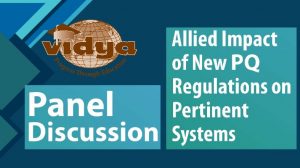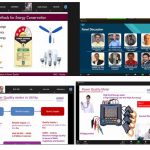EEE Dept organises international panel discussion on power quality
It was an important milestone in Vidya’s quest for excellence in technical competence of its students. The EEE dept of Vidya, under the visionary leadership of Dr Sudha Balagopalan, Prof of EEE and also Dean-Academics, has just started a unique journey into uncharted territories: An intensive 10-day training in power quality for the students of the Dept with highly qualified and competent engineers and technocrats as resource persons. As a prelude the training, to set the right context and to enlighten the academia in the College, the EEE Dept held a highly successful panel discussion on the theme “Allied Impact of New PQ Regulations on Pertinent Systems” in the online mode on 18 March 2021.
Inaugural cermony
The ten-da Powe Quality Training program was kick started on 18 March 2021 with brief inaugural ceremony followed by the panel discussion. Dr Santhosh Prasannan, Chairman VICT, inaugurated the event. Dr P Rajan (Director, Transmission, Distribution and Renewable Energy and Energy Savings (REES)) delivered the keynote address. Dr Sudha Balagopalan gave an overview of the program. The program came to an end with a formal vote of thanks by Mr Vishnu Rach K R (AP, EEE Dept).

Background
The idea for conducting the panel discussion evolved as a necessity of the times. The main motivation for the discussion was the Central Electricity Authority (CEA) regulations notified in the Gazette on 8 February 8 2019 and the Kerala State Electricity Regulatory Commission notification on 9 August 2019. The major contributions were in the form of generous hardware, software and manpower support from the collaborating companies Jef Techno Solutions, Gossen Metrawatt GmbH, Merus Power, Finland and Camille Bauer, Switzerland and Fluke, USA. The current COVID pandemic situation which brought a lot of focus on hospitals, large computational needs and reliance on power electronics based control and automation also pushed the topic of Power Quality into limelight.
It was the concern for creating public awareness, the identification of power utilities with focus on all 11 licensees with KSEB at the Centre and the existence of large establishments with power quality polluting possibilities that motivated the wide spread induction of the experts into the panel. The most suitable leader was identified as the person who had signed the MoU with C-DAC for establishing the PQ Circle as a part of KSEB. Er V Kesavadas, then Chief Engineer (TSO , IT , CR & CAPs) and currently state level advisor, PFC India Ltd, who pioneered related activities led the panel discussion.
Er. V Kesavadas was the moderator for the panel discussion. Other panelists were Er Christo George (CEO, HYKON India Ltd), Er Madhavan Praveen (DGM (Projects), Technopark), Er Vishwanath Sule (Lead Auditor, ESHS, TCS) Er Ashutosh Pailwan (GM Adani Electricity, Mumbai), Er Poulose Mathew (Engineering Consultant), Er Biju Jacob (Asst Executive Engineer, KSEB and Member of the Committee for Power Quality Studies), Er Aneesh Rajendran (Energy Technologist EMC Kerala ).
Following are the key points that were raised in the panel discussion:
- Need for power quality in the present electrical system and its benefits to the society and environment
- Regulations related to power quality and their timely amendments
- Need for students to be aware about the regulations and consumer rights
- Energy efficient systems and power quality maintenance
Overview of the discussions
- Er V Kesavadas
- The discussion began with Er V Kesavadas giving a brief overview about the growing concern of power quality in industrial and domestic systems. He laid a platform for the discussion to build up with focus on the development of present electrical system with consideration to distributed generation, changes happening in automobile industries and domestic loads and the need for imposing regulations with respect to power quality.
- Er. Christo George
- Shared his experience in the field of modern power quality improvement from industrial domain. He was focusing mainly on the solutions to power quality and the installations of power quality improvement equipments like STATCOM and UPQC. He also shared a case study which was conducted by his company and produced the results of improvement in current waveforms.
- Er Madhavan Praveen
- Shared the power quality related issues faced by IT industry where the consumers are highly demanding. He pointed on the need for students to understand about the regulations and timely amendments related to power quality. He also commented on the need for consideration of consumer rights in the regulations.
- Er Vishwanath Sule
- Shared his views on the need for incorporating IoT and AI in the analysis of power related data for ensuring quality power to the consumers.
- Er Ashutosh Pailwan
- Talked about the power quality scenario in urban areas. He introduced the importance of quality in power sector with real life examples that even a common man with very little knowledge in electrical engineering would understand the necessity.
- Er Poulose Mathew
- Shared the problems faced by hospitals and talked about how highly sensitive equipments are suffering due to power quality issues. He commented on the need for strict regulations to be imposed on all types of loads.
- Er Biju Jacob
- Talked about the activities done by the state regulatory board to monitor, analyze and benchmark the distribution system for the proper amendments in the draft regulation set up.
- Er Aneesh Rajendran
- Explained about the impact of energy conservation on power quality. He discussed about how the energy efficient equipments and renewable energy systems introduce power quality issues in to the system and also discussed about some practical solutions and mitigation techniques.
The discussion was concluded by Er V Kesavadas after summing up the key points discussed by the panel members.
Key takeaways:
- Present electrical system has been evolved in to distributed generation and smart grid where there is no need for license to generate power
- There is an urgent need for the strict enforcement of regulations on power system with regards to quality.
- The rights of consumers are also to be taken into consideration.
- Incorporating energy efficient technologies without compromising on quality of power.
- Need for incorporating IoT and AI technologies for power quality analysis and solutions.
- Awareness among the public especially younger generation regarding the importance of power quality is the need of the hour and it is very vital to organize training sessions regarding the same for which assistance has been offered from the side of the eminent panelist.
Image gallery






